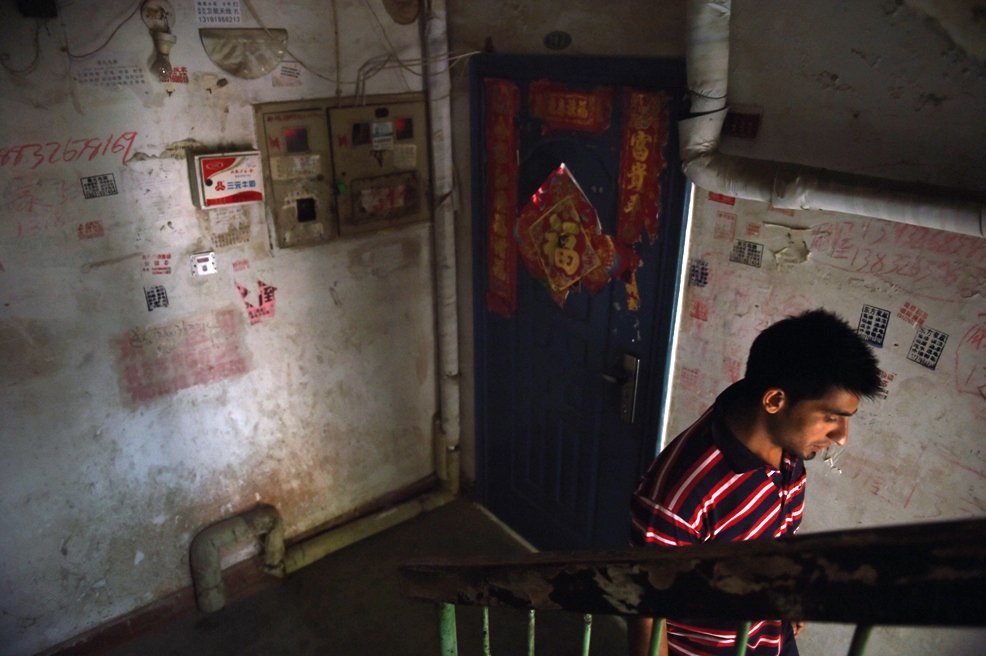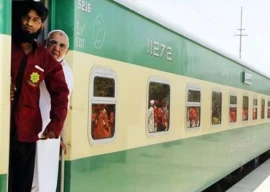
"Every day I heard the sound of guns," said a 37-year-old surnamed Saeed of his former home Lahore.
"We prayed every day, because we felt something could happen to us at any time."
He is one of hundreds of people who have sought asylum in China in recent years, often from conflict and violence-stricken countries including Iraq and Somalia.
The government tolerates their presence but provides almost no support, while human rights groups have for years condemned Beijing for deporting tens of thousands of asylum seekers who enter it to escape oppression in North Korea and Myanmar.
Around 35 of the almost 500 UN-registered asylum seekers and refugees currently in China are Ahmadis. They are among the most persecuted minorities in Pakistan.
In 2010, militants stormed two Ahmadi prayer halls, killing 82 worshippers in gun and grenade attacks, before targeting a hospital where victims were being treated. Ahmadi places of worship and graveyards are regularly desecrated.
China is regularly condemned by the US State Department for its restrictions on religious freedom, which analysts say are key elements of the tensions it faces in Buddhist-majority Tibet and mainly Muslim Xinjiang.
But Saeed, who arrived four years ago, said: "From a security point of view, China is good.
"There is almost no terrorism compared to Pakistan, where there is killing and persecution of minorities every day," he told AFP in a rented apartment in Sanhe, a city outside Beijing where clumps of high-rise apartment blocks overshadow restaurants offering donkey meat burgers.
Two of his cousins were killed in the 2010 attack, he added.
The Ahmadi refugees in Sanhe said they paid middle-men up to $3,000 each for Chinese visas - more than twice the average yearly income in Pakistan.
Once in China, Saeed said, "You have to do everything for yourself."
He lives off overseas family donations and added: "I don't expect anything from the Chinese."
New arrivals receive no benefits unless the UN grants them refugee status after a gruelling 18-month series of tests and even then China refuses to integrate them, denying them the right to work while they wait for acceptance from a third country, often for years.
"In this kind of a situation, you can't enjoy life much," said Saeed.
But teenager Laiba Ahmad, who arrived around two years ago with her mother and several siblings, had no doubts, even though she does not know enough Chinese to attend school.
"I am happy here compared with Pakistan," she said. "Pakistan was dangerous. We could not go outside without our brothers and fathers, if you are a woman especially."
On a recent afternoon around 10 refugees gathered in Saeed's flat for an English lesson. Practising the present tense, they called out descriptions of their jobless lives.
"We play football daily," offered Ahsan Ahmad, 22, who fled Pakistan after extremists attacked two of his uncles.
"We offer prayer daily," said another student.
China signed up to the UN's refugee protocol in 1982, but does not have any mechanism to assess their claims, leaving it to the UN High Commissioner for Refugees (UNHCR).
Its Beijing office has only eight permanent staff to cover the world's most populous country.
"Sometimes I wonder how these individuals survive... the assistance we provide is barely enough," said Francis Teoh, senior UNHCR protection officer.
China adopted a revised entry-exit law last year which entitles refugees to documentation, but refugees and UNHCR said it has yet to be enforced.
Rights groups have previously accused China of taking a harsh stance towards North Korean asylum seekers in order to maintain good relations with Pyongyang.
Pakistan has long been an ally of China, which has fought a border war of its own with Islamabad's arch-rival India.
"Refugee issues in China are tangled with some of the most politically and strategically sensitive issues in the Asia-Pacific region," said Lili Song, visiting researcher at Northwestern University's Center for Forced Migration Studies.
"There may also be concerns about attracting more asylum seekers," she added.
Saeed left earlier this week with his wife and two-year-old daughter for a leafy suburb in the US, ahead of World Refugee Day on Friday.
But others wait on.
Yasir Chaudry, 24, a former air-conditioning engineer who left his wife in Pakistan, shares a crumbling apartment with two other refugees who rise in the late afternoon and fill their days surfing the Internet, watching DVDs, or throwing around a frisbee held together with black masking tape.
"All I have time to do is think, so I think about bad things, like how my family is not together," he said. "I didn't want to leave my country. These problems all come into my mind."
COMMENTS (17)
Comments are moderated and generally will be posted if they are on-topic and not abusive.
For more information, please see our Comments FAQ







1725254039-0/Untitled-design-(24)1725254039-0-270x192.webp)
1732449527-0/Express-Tribune-(4)1732449527-0-270x192.webp)
1732441230-0/BeFunk_§_]__-(49)1732441230-0.jpg)







After a broaded eye on this situation....the only thing which justify you is that it is a consipiracy ....such minorities did this things willingly so they can move to well developed countries....
Well this is not true at all. I know many qadiyani families livings in different areas.They easily go outside ,in market ,for education. This is just to reflect the bad image of Pakistan.
Minorities' persecution is a very real issue, but where exactly in Lahore does one hear the sound of gunfire everyday? It may sound catchy but it's far from the truth.
religion and faith is a citizens personal right. It's not about who is true who is false who is heretic and who is acceptable. it is about peace love and tolerance. I am amazed at those who say minorities are living normal lives. !! your life is not safe, you are discriminated on basis of your faith in terms of job, education, social circles. you are not allowed to offer prayers in free manner. you are not even allowed to call yourself Muslim you are given separate non Muslim voters list. stickers and posters against you are posted everywhere. People call you with derogatory name rather than name of your sect. Every month people from your sect are killed and still you are made to believe that you are living a normal life. Amazing.
@usman786: Yes, but not as refugees..As entrepreneurs, qualified professionals, building wealth, contributing to the society, and most importantly, integrating perfectly into their cultures..That's India for you!!!
Cheers
@Riaz Murtaza:
You mean they are equally killed?
Many Qadianis move to other countries to get a refugees status. Like many did around two decades ago to Germany, Canada and other western countries. Citizens are equaly treated and a big city of Rabwa is located in Pakistan where there is huge Ahmadi community.
The persecution of the Ahmadees in Pakistan is a common knowledge. Regrettably the concerned authorities are still in the denying mode refusing to admit that the Ahmadees continue to be hounded and killed with total impunity. Unless the Government admits that there is a real crisis, it cannot address the problem.
@anshul: thats why I see indian spread all over world be it remote part of Africa.
Well Chalte ka naam zindagiiii . What cannot be cured has to be endured. May god give them strength to endure these tough times.
ET what are you trying to portray here? another strong case for these hypocrites? Showing such snaps does mean that all of the "these" are exactly what they seem to be
Listen I have family who are qadianis, and it's not like how it's portrayed in articles like these. They roam freely, nobody accosts them, and they can pray at their prayer centers, no threats. They are totally integrated into the society. Stop lying about the situation please, they are in as much danger as anybody else.
This is such a shame. Pakistan was a country made where people could freely practice their religion or faith, as long as it did not hurt anybody. Now it has become a hotbed for religious prosecution.
When jungle rules run a country only might can survive else hv to leave or perished